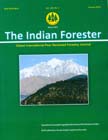Response of Wheat to Different Irrigation Regimes Given under Poplar (populus Deltoides Bartr. Ex. Marsh) Based Agro forestry System
DOI:
https://doi.org/10.36808/if/2013/v139i1/29138Keywords:
Agro Forestry, Moisture Stress, Wheat, Grain Yield, Quality, Inter-cropping.Abstract
A recently released, short duration wheat variety PBW-550, was intercropped in the poplar trees planted during February 2009 at a spacing of 5*4m on sandy soil at Punjab Agricultural University, Ludhiana. The experiment was conducted using randomized block design with four irrigation treatments viz; I1 (Irrigation after 40mm CPE), I2 (Irrigation after 60mm CPE), I3 (Irrigation after 80mm CPE) and I4 (Irrigation after 100 mm CPE) given to poplar plantation and having six replications. The wheat yield was lower under the intercropping, more so during the second year, as compared to the pure crop. The reduced irrigation regimes further reduced the grain yield of wheat and the best results were obtained with the I1 irrigation regime. The grain appearance score, test weight and grain hardness were all affected negatively during the second year of poplar growth and the restricted irrigation treatments. Consequently the grain protein content increased with those treatments owing the shriveling of the kernels whereby the bran to endosperm ratio increases. However the effect on the sedimentation value was not so pronounced.Downloads
Download data is not yet available.
Downloads
Published
2013-01-01
How to Cite
Singh, A., Singh, R., & Kaur, H. (2013). Response of Wheat to Different Irrigation Regimes Given under Poplar (populus Deltoides Bartr. Ex. Marsh) Based Agro forestry System. Indian Forester, 139(1), 75–77. https://doi.org/10.36808/if/2013/v139i1/29138
Issue
Section
Articles
License
Unless otherwise stated, copyright or similar rights in all materials presented on the site, including graphical images, are owned by Indian Forester.





